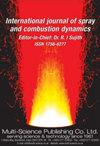喷雾数密度和蒸发率对速度振荡的响应
IF 2.1
4区 工程技术
Q3 ENGINEERING, MECHANICAL
International Journal of Spray and Combustion Dynamics
Pub Date : 2022-03-01
DOI:10.1177/17568277221085957
引用次数: 1
摘要
对气体速度振荡对液滴数密度和蒸发速率的影响进行了理论研究。气体速度的振荡导致数密度波,即液滴浓度的不均匀、不稳定变化。当数密度波以平均流速向下游传播时,会引起局部蒸发率的调制,从而产生具有当量比相应振荡的蒸汽波。目前的工作设计了这些过程的分析公式。首先,根据数密度波对液滴群体对气体速度振荡的响应进行建模。其次,将该公式扩展到包含液滴蒸发,从而获得蒸发速率调制的解析表达式。随后,使用适当的格林函数求解具有计算的蒸发源项的液滴1D对流-扩散传输方程,以确定所得到的当量比扰动。当量比波动对速度振荡的动态响应最终用与频率相关的传递函数来表征。上述分析方法依赖于许多简化近似,但与一维欧拉-拉格朗日CFD模拟结果一致。本文章由计算机程序翻译,如有差异,请以英文原文为准。
Response of spray number density and evaporation rate to velocity oscillations
A theoretical investigation of the effect of gas velocity oscillations on droplet number density and evaporation rate is presented. Oscillations in gas velocity cause a number density wave, i.e. an inhomogeneous, unsteady variation of droplet concentration. The number density wave, as it propagates downstream at the mean flow speed, causes modulation of the local evaporation rate, creating a vapour wave with corresponding oscillations in equivalence ratio. The present work devises an analytical formulation of these processes. Firstly, the response of a population of droplets to oscillations in the gas velocity is modelled in terms of a number density wave. Secondly, the formulation is extended to incorporate droplet evaporation, such that an analytical expression for the evaporation rate modulation is obtained. Subsequently, the droplet 1D convection-diffusion transport equation with the calculated evaporation source term is solved using an appropriate Green’s function to determine the resulting equivalence ratio perturbations. The dynamic response of equivalence ratio fluctuations to velocity oscillations is finally characterized in terms of a frequency-dependent transfer function. The aforementioned analytical approach relies on a number of simplifying approximations, nevertheless it was validated with good agreement against 1D Euler-Lagrange CFD simulations.
求助全文
通过发布文献求助,成功后即可免费获取论文全文。
去求助
来源期刊

International Journal of Spray and Combustion Dynamics
THERMODYNAMICS-ENGINEERING, MECHANICAL
CiteScore
2.20
自引率
12.50%
发文量
21
审稿时长
>12 weeks
期刊介绍:
International Journal of Spray and Combustion Dynamics is a peer-reviewed open access journal on fundamental and applied research in combustion and spray dynamics. Fundamental topics include advances in understanding unsteady combustion, combustion instability and noise, flame-acoustic interaction and its active and passive control, duct acoustics...
 求助内容:
求助内容: 应助结果提醒方式:
应助结果提醒方式:


